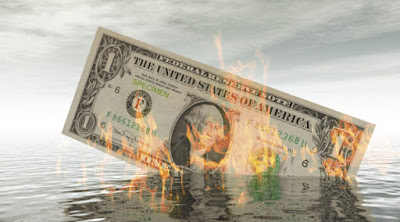I've said it many times before, the US economy is headed to a severe downturn or recession. There are a number of reasons for this, but ultimately it boils down to consumer choices and spending patterns. The biggest problem the US voter faces is the rate of inflation, it is completely out of control and constantly rising. Basis economics tells us that the greater supply of a recourse, the less value it will hold. For example, gold is expensive because it's hard to find and difficult to mine. However, if every stream and river were filled with gold, then gold would become worthless. The same rules apply to money; the greater the supply of money, the less value it has. With a weakened dollar, prices will appear to rise. The Federal Reserve went on a money printing spree called Quantitative Easing after the 2008 recession, in the vain hopes that it would spur economic growth. Their scheme failed
This CNN article attempts to paint a rosy picture of the economy and it's very sluggish growth; however, the article's author as well as many economists failed to account for the underlying factors that have resulted in the current situation.
http://money.cnn.com/2017/01/27/news/economy/us-gdp-2016/index.html
Continuing the discussion of supply and demand. The amount of printed US currency is currently estimated to be about $1.5 Trillion by the Federal Reserve, but the amount of total us debt is about $47 Trillion. Of that $47Trillion in debt, $19 Trillion is US government debt, $14.6 household debt, and $13.4Trillion was business debt. Of the $14.6Trillion household debt, $1.2Trillion was due to student loans. What do all these giant numbers mean? The amount of debt is money that has already been spent and must be paid back. Let's consider, the greater the supply of money the less it's value. Therefore, if taken to it's logical conclusion, the amount of debt is also adding to the rate of inflation. People are beginning to ask why the cost of higher education has risen so quickly over the past twenty years. The answer lies in plain sight: the Student Loan programs are a guaranteed source of revenue for schools. Colleges can keep raising their prices because they are certain that their customers (students) can borrow the money and pay the costs. The medical care industry is operating in the same manner. Hospitals and doctors can keep raising prices because someone: the patient, insurance, Medicare, or some other program will eventually pay.
The US economy will continue to be sluggish, right up to the point that it begins fall into a recession. Regardless of who won the election, these problems will not go away without an extended period of economic deflation that will correct the many imbalances in the economy.

